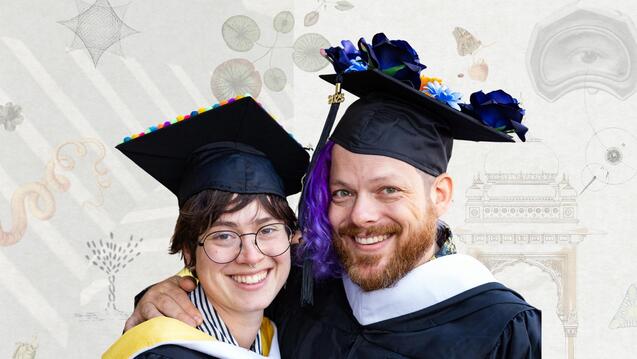
Doctor of Philosophy in Human Sexuality
A doctoral degree for professionals shaping the future of Critical Sexuality Studies
Program Overview
Our Approach
Our Human Sexuality Ph.D. program helps shape the research, practice, and cultural dialogue around a wide variety of sexuality-related subjects. We emphasize intersectional and critical views of sexuality that include attention to salient power differentials including: ethnicity, race, gender, class, age, ability, national origin, religion, and geography.
Our students engage in rigorous academic exploration by learning and evaluating differences in theories and synthesizing theoretical and methodological approaches. Through coursework, students undergo an analysis of power structures by exploring the many socio-cultural organizations of sex and gender that influence societies.
A primary goal of our program is the ability for each person to identify their own values and participate in exchange of controversial ideas and positions while maintaining the respect for the inherent worth of each person, even those with whom one adamantly disagrees. Our program is inspired by a spirit of inclusivity and equity, seeks to further the dialogue and actual benefits for expanded freedom, rights, and expression in human sexuality.
Our students advance the field of sexuality studies through the original research in their dissertation. Many students use their dissertation to contribute to growing bodies of research in areas including clinical work, sex education, and activism.
Career Paths
Most students enter our doctoral program as early or mid-career professionals. Using their dissertation subject, students work over the course of their time in the program to network into exciting career pathways. The Ph.D. prepares students for a wide range of professional opportunities:
- Research (basic research, translational research, or applied research)
- Education (K-12, higher education, and community education)
- Clinical and counseling mental health (including LGBTQ+ Centers, community mental health clinics, women’s centers)
- Advocacy and policy advisement (including reproductive rights and pleasure activism)
- Nonprofit health organizations (including women’s health, HIV/AIDs clinics, transgender health, and eating disorder clinics)
- Entrepreneurial pursuits and startups (including research consulting, starting SexTech or FemTech businesses)
- NGOs or governmental efforts (including anti-trafficking efforts, health departments, and human rights organizations)
Students should note that while select courses integrate several core knowledge areas of the American Association of Sexuality Educators, Counselors, and Therapists (AASECT) to assist students seeking AASECT certification, the Ph.D. in Human Sexuality by itself does not lead to AASECT certification.
Curriculum
CIIS’ primarily online Human Sexuality Ph.D. starts with four semesters, 44 units of online coursework, including readings, and discussion boards which are taught asynchronously. Students then complete two comprehensive exams and a dissertation that contributes to the field of critical sexuality studies. After the completion of the dissertation research and manuscript, a public dissertation defense is held.
The program also includes academic residency weekends that engage students both in-person and via Zoom. The academic residencies are four-day weekends that take place three times per semester. There are two in-person academic residencies that take place at the start of the fall semester and near the end of the spring semester. All other academic residencies are virtual. Academic residencies are incredibly important for our program, as this is where we meet to inspire and support each other on the journey towards tomorrow’s critical sexuality studies.
Our semesters are held over fall (Aug-Dec) and spring (Jan-May). The average time to complete the program is five to six years for full-time students.
Curriculum Highlights
HSX 7173 Sexual Theory and Intersectionality (3 units) This foundational course surveys various theories through a lens of critical sexuality studies using a triadic framework: (1) concepts, (2) abjection, and (3) normativities. It is a primer for orienting the vast works that inform the field using critical sexuality studies as a central way of understanding and synthesizing these. The theories examined in this course are not exhaustive, but many have been applied to provide fruitful insights into various questions regarding sexuality. Further, this course supports the idea that experiences of sexuality and gender are collocated within power structures articulated as intersectional positionalities, such as race, ethnicity, class, nation, geographic location, age, religion, sexed body, dis/ability, and various other salient social and cultural locations, identities, and ascriptions—neither sexuality nor gender may be accurately understood without such contextual specificity. The emergent field of critical sexuality studies aims to agree not on content but on a basic orientation for thinking about the phenomena of sexuality and related praxis in research and applied work.
HSX 7228 Global Sexualities (3 units) This course considers sex- and gender-related practices, desires, and identities around the world with an emphasis on non-Western contexts. In the first part of the course, students will become familiar with some of the problematic assumptions that have imbued theorizing gender and sexuality from within Western frameworks. Additionally, it will examine alternatives to approaching knowledge production about other peoples and practices that decenter a Western gaze. After becoming acquainted with this general approach, the course continues with a survey of contemporary issues and debates centering on different ways of knowing that inform sexual cultures. Special topics of focus may include sexual migration, globalization, and its impacts on Indigenous sexual/gender identities; transnational comparisons of sex work; virtual intimacies; body modification and desire; and the global HIV/AIDS epidemic, among others.
HSX 7232 Problems and Professional Issues in Sexuality (3 units) The focus of this course is to address issues of ethics, axiology, exploitation, abuse, harassment, assault, trauma, rape, rape culture, sex trafficking, problematic sex (e.g., compulsions, dysfunction, sexuality and substances, and disease), and other issues that can be thought of as problematic. While not necessarily subscribing to a pathologizing or criminalizing view, these important issues will be thoughtfully considered in a historical, contextual, reflexive, and critical manner. Attention will be paid to the history of the field, current controversies with internet sexuality, ethics, philosophical issues, and professional communication skills. These content areas are aligned with AASECT’s course knowledge areas and are part of the required content for sex therapy and sex educator certification.
-
First Year Coursework
In the first year, we build the cohort experience, and lay down an intersectional foundation of knowledge including concepts, theory, and methodology.
Semester 1 | Fall
HSX 7170 Introduction to Human Sexuality (3 units)
HSX 7173 Sexual Theory and Intersectionality (3 units)
HSX 7885 Understanding Research (3 units)
Semester 2 | Spring
HSX 7229 Sexual Function and Practices (3 units)
HSX 7175 Sexual Orientation and Gender Identity (3 units)
HSX 7232 Problems and Professional Issues in Sexuality (3 units)
Second Year Coursework
In the second year, students continue to refine their research questions and learn more about methodology, content, and theory.
Semester 3 | Fall
HSX 7263 Sex, Gender, and Reproductive Rights (3 units)
HSX 7228 Global Sexualities (3 units)
HSX 7237 Methodology I (3 units)
Semester 4 | Spring
HSX 7274 Gender and Queer Theory (3 units)
HSX 7238 Methodology II (3 units)
HSX 7236 Sex Education and Learning Theory (4 units)*
OR
HSX 7234 Sex Therapy Professional Skills (4 units)*
*Elective course – students take one elective (of at least 3 units) in year two and may choose from the two listed above or any others offered online at CIIS.
Third Year and Beyond
Starting in the third year, students take comprehensive examinations, also known as qualifying examinations. Students get two tries on each exam and must pass these examinations to move to the dissertation phase of the program. Dissertation proposal generation takes one to three semesters maximum, with an average duration of two semesters. Once a proposal has been accepted by the student’s dissertation committee and approved by the department Chair and Provost, the student becomes a doctoral candidate and then may enroll in a dissertation seminar. Students are allowed a maximum of four years to complete and defend their dissertation once they become doctoral candidates. Comprehensive Examinations
HSX 7883 Core Concept Comprehensive Examination (3 units)
HSX 7884 Literature Review Comprehensive Examination (3 units)
Dissertation
HSX 9800 Dissertation Proposal (0.1 unit)
HSX 9900 Dissertation Seminar (0.1 unit)
Total: 42.2 - 43.2 units
Entry Requirements
If you would like to learn more about this program, we’re here to help. Explore our program further with in-depth materials, discuss your personal and career goals at one of our open houses, or get in touch with our admissions counselors, who are ready to assist you in navigating the application process.
Required Application Materials
Your application is your opportunity to share who you are. To be considered essays and written responses must be your own authentic work.
Online Admissions Application: Begin the application process by submitting an online application and paying the nonrefundable $68 application fee.
Degree Requirement: A master's degree from an accredited college or university. The master’s degree must be conferred to begin fall semester classes but may be in process during application to the program.
Minimum GPA: A GPA of 3.0 or higher in previous coursework is required. However, a GPA below 3.0 does not automatically disqualify an applicant and CIIS will consider a prospective student whose GPA is between 2.0 and 3.0. These individuals are required to submit a GPA Statement and are encouraged to contact our Admissions Team to discuss their options.
Transcripts: Official transcripts from all accredited academic institutions attended where 7 or more credits have been earned. Transcripts may be sent digitally to materials@ciis.edu or mailed to CIIS in their official, sealed envelope. Transcripts from institutions outside the U.S. or Canada require a foreign credit evaluation through World Education Services (WES). CIIS will also accept foreign credential evaluations that are in a comprehensive course-by-course format from the current members of the National Association of Credential Evaluation Services (NACES).
Admissions Essays: Please answer the questions below.
- What does critical sexuality scholarship mean to you? How do you see doctoral study in human sexuality at CIIS advancing your professional goals? (500-word maximum; Note: The admissions committee will consider both the content and writing style of your written responses to all questions.)
- Describe the research or topical interests that inspire your work in our program. Propose an area of study for your dissertation topic and a tentative research question. Mention or cite the names of scholars or academics, either those teaching within the Human Sexuality department at CIIS or those whom you have either read or worked with as a way to show us that you understand what doing doctoral-level work means. (500 word maximum)
- Please describe any relevant experience you have had working on the subject of human sexuality in your current or past employment and/or volunteering (e.g., in your work as a therapist, as a volunteer at an LGBTQIA center, working on issues of sex trafficking, teaching sex education in schools, activist work on transgender rights, running sexual harassment trainings/workshops, etc.). (200-word maximum)
- Please comment on how you will balance the demands of a doctoral program with your other obligations (e.g., employment, caretaking, volunteering, self-care, etc.). Be sure to include whether you participated in any form of distance education (e.g., fully online, or hybrid meaning part in-person and part online) coursework and how you manage to stay on task and motivated while in coursework. (350-word maximum)
Resume/CV
Two Letters of Recommendation: One letter must be from an academic reference and one letter must come from a professional reference. Recommendations should use standard business format and include full contact information including name, email, phone number, and mailing address. If an applicant has been out of school for more than five years, two letters may be submitted from professional references.
Group Interview: After an applicant submits a complete online application and all supplemental documents are received, the Human Sexuality department will review the application materials and will conduct group interviews with viable candidates.
Events and Info Sessions
An online event with Admissions Counselors Skylar Hall and Ronda Sharp
Attend our in-person event on January 31 or online event on February 21.
An Online Overview with Jennifer Gruczelak and Ronda Sharp


FAQ
-
The Human Sexuality Ph.D. curriculum is taught fully online, with the exception of one in-person academic residency per semester during coursework. For full-time students, the first two years of coursework are held asynchronously online and include three synchronous academic residencies per semester. Two of the academic residencies are virtual and the third is in-person. These academic residencies are 4-days long starting Thursday morning and ending Sunday evening.
After coursework and during the comprehensive examinations and dissertation phases, students are not expected to travel to campus. Students are expected to be active participants online and at residencies, use our online learning management system for dialogue, submit their assignments, and follow the course curriculum with daily interaction.
The benefit of an online program means that students do not need to relocate to San Francisco to pursue this degree, but still receive the benefits of in-person collaboration and community-building. Being online makes our program available to more people, and enriches the student dialogue in sexuality studies by integrating student perspectives from different places around the U.S. and internationally.
-
After coursework and during the comprehensive examinations and dissertation phases, students are not expected to travel to campus. Students are expected to be active participants online and at residencies, use our online learning management system for dialogue, submit their assignments, and follow the course curriculum with daily interaction.
-
The three academic residency weekends are generally held within the first two weeks of the semester, around the middle of the semester, and two weeks before the end of the semester.
Academic residency schedules for a given semester are communicated to all students at least one week before a semester begins and align with course times listed in the course registration portal under each course.
Academic residency weekends allow our program to accept a more diverse group of students, and enrich student dialogue in sexuality studies by integrating student perspectives from different places around the U.S. and internationally. Coming together for academic residencies allow students to build rapport with each other and faculty, facilitating a deeper sense of community for scholar development and networking with peers. Dissertation defenses are conducted virtually via video conference given that our students and their colleagues, family and friends are located across the globe.
-
Courses in the Human Sexuality Ph.D. program guide students through the history of sexuality studies, including paying close attention to the ways that white, Western ideas of sexuality laid the groundwork for much of the early field.
Beginning with a critical engagement with the historicity of sexuality studies allows our program to, from the very first semester, engage with the vibrant interventions and reclamation of the field from previously silenced voices.
More specifically, our program centrally includes scholarship by and for those who are positively shaping and expanding the field in recent decades to on issues related to BIPOC (Black, Indigenous, and People of Color) LGBTQ+, women of color (WOC), and intersections between sexuality and transgender experience.
We join these content-based courses with courses that build research skills in multiple research methodologies (or ways of thinking about theory as applied to the practice of research) as well as teaching about qualitative, quantitative and mixed methods (ways of doing research).
Together, our curricula joined with the scholar-practitioner model shape the engaged and timely critical sexuality studies research that are a signature of our students and graduates.
-
Full-time students can expect to complete the degree within five to six years with some taking less time and some more time dependent on the dissertation project.
For full-time study, there are two years of coursework (three courses per semester), one semester of comprehensive exams (if passed on the first try), and dissertation preparation/research. Once the coursework and comprehensive exams are complete, students dive into the dissertation process with support from their dissertation committee.
The U.S. Department of Education sets a maximum of 10 years from the date of enrollment to complete the program. But once a student becomes a dissertation candidate, CIIS faculty have set the timeline of four years to complete the dissertation project and graduate.
-
We schedule academic residencies for three long weekends each semester, with the intention of not cutting too deeply into the standard workweek. However, full-time students can expect roughly 40 hours of schoolwork each week as they participate in online discussion forums, and complete reading and writing assignments.
Many students do work full-time during coursework and balance this load by setting up flexible work arrangements, switching jobs to allow more time for school, or using time off to complete assignments when needed during the semester. We would be happy to put you in touch with current students to get a better idea of how they manage their schedules.
-
It is possible to attend the program part-time at two courses per semester, rather than three. Students who do this will straddle two cohorts.
-
Yes, you can. You will be provisionally accepted to our program until you submit the final transcript from your master’s program.
-
You bet! Like us on Facebook.

Take the Next Step
For over 50 years, CIIS has been at the forefront of education that integrates rigorous science, innovative scholarship, and social justice. You will learn from faculty at the forefront of their fields, local artists and activists, and a community of peers as passionate and dedicated as you. There’s never been a better time to be here – let’s build a healthier and more equitable world.




